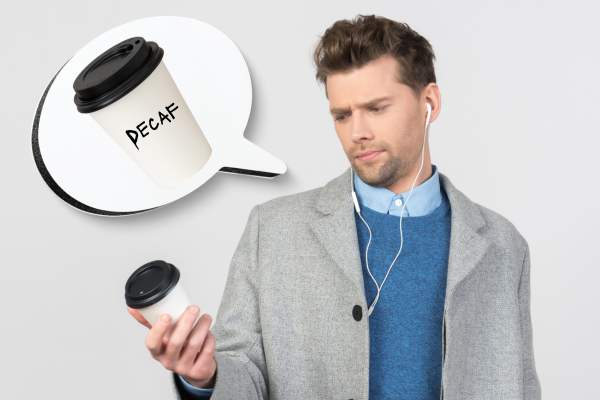Often, caffeine is the culprit for many side effects people may develop from drinking regular coffee. Some of the side effects are risks of osteoporosis, bladder irritation or urinary incontinence, menstrual problems, miscarriage, increased blood pressure, insomnia, and stomach disorders.
Hence, people start switching to decaffeinated beverages since they contain significantly less caffeine. Decaf coffee is a better alternative to regular coffee if you are trying to limit your daily caffeine intake.
In rare cases, if you are highly sensitive to caffeine, the small amount in decaf coffee may also trigger some health issues. In this article, you will learn in detail about “Does decaf coffee irritate the bladder?”.
Caffeine can cause bladder irritations at the same time, and it is also a diuretic that promotes increased urination.
If you have a sensitive bladder and wonder whether decaf can cause bladder irritation, the answer will depend on the severity of the issue.
Decaf coffee is generally a safe beverage, as there is not much evidence that the caffeine in this beverage will cause bladder irritation. However, since decaf coffee is more acidic, this may trigger bladder irritation in some people.
Bladder Irritation

Inflammation in the lining of the bladder leads to bladder irritation. This issue is common among most women. There are various causes of bladder irritation. Infections, allergies, chemicals, trauma, medical conditions, and injury are a few reasons.
Some of the food items may also cause bladder irritation. Coffee addicts may experience this issue since caffeine triggers bladder irritation.
Common Symptoms of Bladder Irritation
Following are some common symptoms a person with bladder irritation might experience: If you experience any of the symptoms below, it is better to consult a doctor before they worsen.
- When urinating, you feel a burning sensation.
- Urge to urinate frequently.
- Small amounts of urination.
- Lower abdominal pain.
- Blood in the urine.
- Strongly smelling urine
Preventing Bladder Irritation
You can take specific measures to prevent bladder irritation.
- Keep yourself hydrated by drinking plenty of fluids. These fluids will dilute the bladder’s urine and help eliminate bacteria near the urethra.
- After using the washroom, wipe from your back to front using toilet paper.
- After sexual intercourse, urinating will remove any bacteria that enter during the activity.
- Avoid wearing tight clothes, as this may put pressure on the bladder.
- Avoid consuming foods and beverages that may cause bladder irritation.
Will Decaf Coffee Cause Bladder Irritation?

Your daily cup of joe helps boost your energy level and keeps you focused. While there are many health benefits to consuming coffee, on the flip side, there are also some disadvantages.
Caffeine can cause bladder irritation, which is an embarrassing and uncomfortable issue. In contrast, will decaf coffee cause bladder irritation?
Most research and studies have found that decaffeinated beverages do not cause urinary symptoms or bladder irritation. Hence, switching to decaf coffee from regular coffee will reduce bladder irritation.
It is crucial to know that decaffeination does not make coffee beans caffeine-free. Hence, a cup of decaf coffee will contain around 3 mg of caffeine.
If you are highly sensitive to caffeine and have a sensitive bladder, these traces of caffeine in decaf coffee may trigger bladder irritation.
Therefore, consult the doctor and check on your health condition. The medical practitioner will tell you whether to consume decaf coffee and how many cups you can drink daily.
Note: On rare occasions, people might have to avoid decaffeinated coffee if they experience bladder irritation due to decaf coffee.
The Taste the Difference Challenge

The University Hospitals of Leicester NHS Trust’s (UHL) Adult Continence Team decided to educate the housekeepers and staff of the Leicester hospitals about the benefits of drinking decaffeinated coffee.
They highlighted that the beverage is an excellent choice for a healthy bladder as it will reduce urinary urgency and over-reactivity.
The housekeeper proactively provided the patient with decaf coffee and got their feedback.
Around 50% of the patients who took part in this taste the difference challenge could not taste the difference between regular and decaf coffee. More than 76% of the participants were willing to switch to decaf coffee because of the benefits.
The result of the project showed that the falls related to toileting were reduced.
A Study in Neurourology and Urodynamics Paper Related to Urinary Incontinence

Urinary incontinence is caused by an overactive bladder, where an individual accidentally leaks urine. In this study, there were two groups of people.
One group was provided regular coffee (450 mg of caffeine) for five days, while the other drank decaffeinated coffee (12 mg) for five days.
After the study, they observed the results with the previous caffeine usage and urinary symptoms.
The study found that the participants who consumed high amounts of caffeine showed signs of bladder irritation, like frequent urination. At the same time, the participants who switched from regular coffee to decaf coffee during the study observed decreasing urinary symptoms. Therefore, they concluded that avoiding high caffeine intake will help reduce urinary symptoms.
5 Food Items That May Cause Bladder Irritation
Besides caffeinated beverages, many other food items can increase the risk of bladder irritation. Knowing about this food and drink is crucial to prevent bladder irritation.
- Tomato products: since tomatoes are acidic, they will cause bladder irritation. Hence, it would help if you avoided ketchup, pizza sauce, salsa, pasta, and other food items made using tomatoes.
- Chocolate: The caffeine in chocolate can worsen the symptoms of bladder irritation.
- Carbonated beverages: energy drinks, sodas, and soft drinks, will cause overreactive bladder symptoms due to the caffeine content and carbonation.
- Citrus Fruits: the citrus acids in oranges, lemons, grapes, and limes will irritate the bladder.
- Processed food: the flavors and preservatives in processed food will worsen OAB and irritate the bladder.
Sweeteners, spicy foods, alcohols, onions, and cranberries may also cause bladder irritation.
Note: While avoiding food, you must drink plenty of water to dilute your bladder. This way, you can prevent bladder irritation.
Bottom Line
By reading this blog, you might have understood that decaf coffee will not impact bladder irritation. Some highly caffeine-sensitive people may show urinary symptoms due to decaf coffee.
This beverage is a healthy alternative to caffeinated drinks as it helps reduce overreactive bladder symptoms.
If you plan to switch to decaf coffee, talk to your doctor about it, as he can suggest whether the beverage will suit your health.
FAQs
Is Decaf Coffee Safe for People with Bladder Irritation?
Yes, the caffeine in decaf coffee will not significantly trigger OAB symptoms.
Since each individual reacts differently to caffeine, talking to a healthcare professional before drinking decaf coffee with bladder irritation is better.
Does Tea Irritate the Bladder?
Yes, the caffeine in tea will cause bladder irritation.
You can drink decaf or caffeine-free herbal teas, which will not cause urinary symptoms.
Should I Drink Water with Decaf Coffee?
Yes, you must not reduce your daily water consumption, as it helps to dilute the bladder.
Decaf coffee is a supplement, whereas it is not a water replacement.












